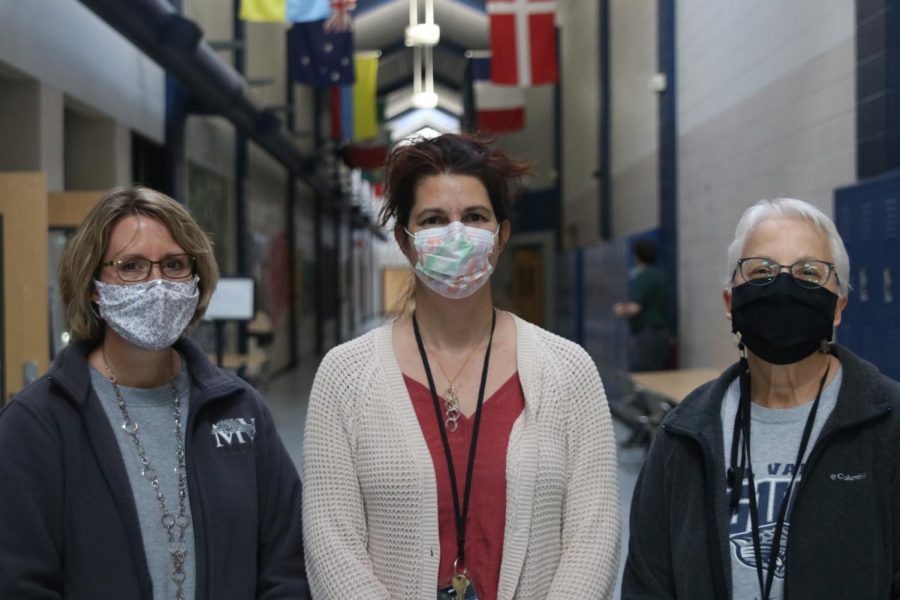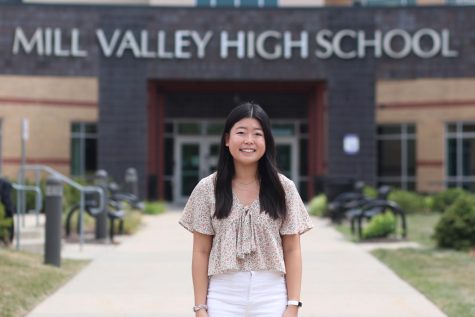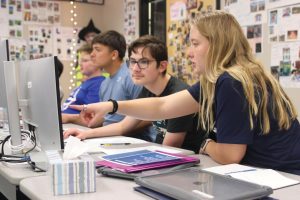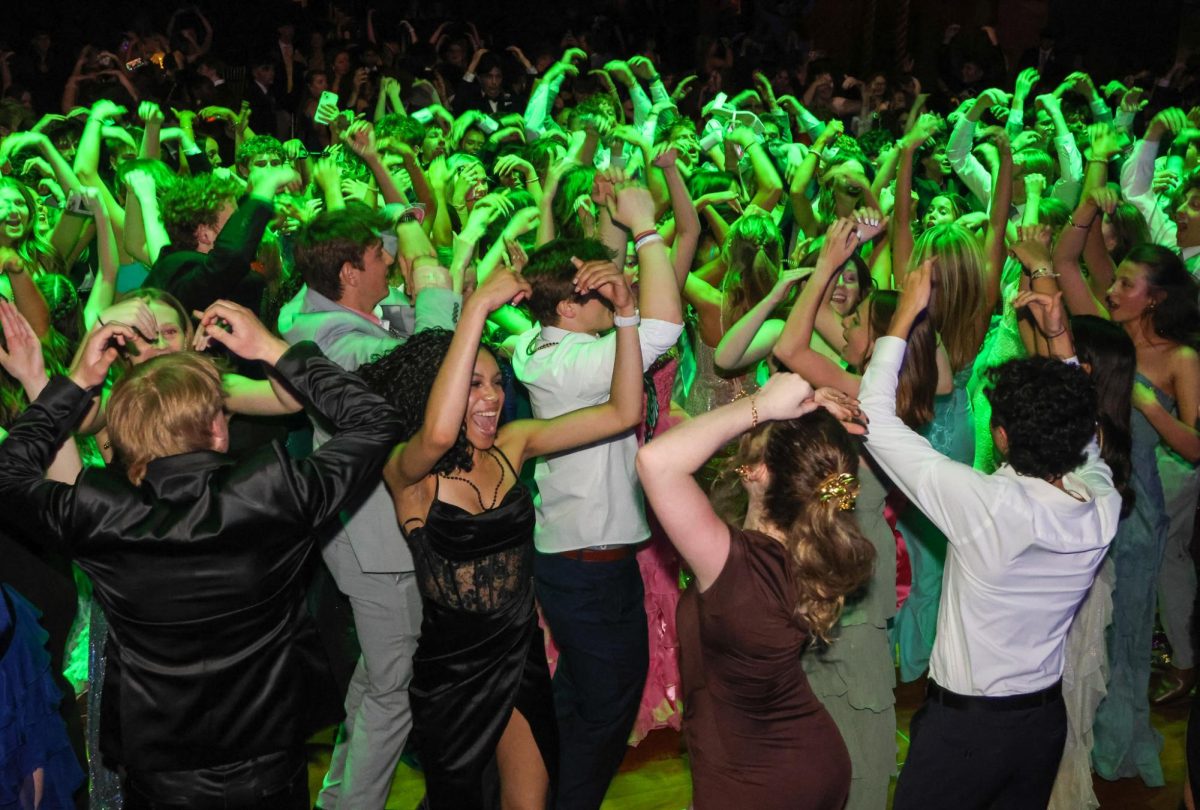Science teachers participate in COVID-19 vaccine trial
Teachers Landra Fair, Donna Riss, and Julie Roberts volunteered for the Moderna COVE Vaccine Study
By Lily Godfrey
Science teachers Landra Fair, Julie Roberts and Donna Riss describe their experiences being a part of a trial for the COVID-19 vaccine.
November 15, 2020
Science teachers Julie Roberts, Landra Fair, and Donna Riss explain their experiences while participating in the Moderna COVE Vaccine Study at Johnson County Clin-Trials in Lenexa.
Mill Valley News: What was the basis of the trial about?
Landra Fair: This was the third phase of the COVID vaccine by Moderna.
Donna Riss: This vaccine study is the Moderna study, so it’s a messenger RNA vaccine. Which is different from vaccines that we’re all familiar with. It’s the same type of vaccine as the Pfizer vaccine that’s in the news right now. So just seeing whether or not a vaccine of this type would be effective.
Julie Roberts: The goal was to develop a type of vaccine that has not been used before, to my knowledge, this specific vaccine is one that uses mRNA – essentially providing instructions for your body on how to fight COVID rather than using deactivated virus (as some vaccines do). From the Moderna website “…mRNA medicines are sets of instructions. And these instructions direct cells in the body to make proteins to prevent or fight disease.” Another benefit for this type of vaccine is that it can be produced without expensive, specialized equipment so it could, in theory, be produced around the world including countries without a lot of money or infrastructure for producing vaccines. It makes this vaccine a viable option for everyone!
MVN: What made you want to volunteer for this kind of specific trial?
LF: The main reason is that I knew, or thought, that I’d be coming back to school. I had spent the whole summer being very careful and not putting myself in harm’s way; but I definitely felt like coming back to the classroom was putting myself in harm’s way. I thought that maybe if I got the vaccine it would make me feel a little more comfortable, kind of insured.
DR: Well this was one that was offered in the Kansas City area first of all. The time that I started [to think about] participating was when we were going back to school. Honestly, I was very anxious about coming back into a building full of students and full of other adults. Just like everybody, I have people in my life that are compromised. I help take care of my mom, so I wanted to be able to continue to do those things. [My family and I] were pretty isolated in the spring and even in the summer, and we were being really careful. So, coming back into a building full of students and other teachers, [made me] nervous, I was very nervous about that. So, participating in the study, understanding that for this virus the way that we’re going to be able to have any normalcy is with the vaccine. We’ve shown in our country and our community that we haven’t been able to keep the levels of the virus down. Participating in this study was to know that this is a way forward; and being able to participate in that [made me] happy to do it. There was another colleague of mine that also participated, and that colleague’s comment was, “This is at least something I have control over,” and that’s kind of another way to look at it. When she said that I thought, “Yes, this is something I can do, I can control this.” Frankly I was thinking maybe I’ll get the actual vaccine, and not the placebo. The vaccine itself is a two-injection vaccine, so whenever [doctors] start giving [the vaccine] that’s what people will get. It’ll be an initial injection and then a booster, which is another injection. I received mine a month apart, and I didn’t experience any symptoms. If I was a betting person I would believe that I got the placebo too.
JR: I decided to volunteer because I wanted to be part of helping fix this problem and get us back to “normal.” Prior to teaching I was a research biologist and know what goes into the research process. I felt comfortable with the safety of the vaccine, as far as any serious, long lasting health impacts, knowing it was in stage 3 of testing. I would not be comfortable participating in stage 1 or 2 where they are still figuring out a lot of the safety aspects. My 19-year old daughter and husband are participating as well. If I had any doubts about the safety of the vaccine that would not be the case. As a selfish bonus, the trial pays $2,000 per person and I won’t have to wait in long lines to get the vaccine once it is approved
MVN: What was your experience like?
LF: It’s been pretty easy. You go in and [the company workers] ask you a couple health questions, they take blood, and I have to fill out a diary on my phone; it hasn’t been a lot of work. I’ve had two vaccines and I had no symptoms or reaction at all to either vaccine. Which I suspect that they were both probably placebos. Since half of the people get the actual vaccine and the other half of people get placebos.
DR: I had no idea what this was going to be like, I’ve never participated in something like this. [The company] was very thorough, I gave a very thorough medical history, [the company] also did a very thorough check of anything health wise, to allow you to participate. In fact, when I first went in for my initial appointment when I would’ve gotten a vaccine, I had a very small fever blister. Because of that, [the company] would not give me the vaccine that day, I had to wait. So, any small thing with your health, [the company] wanted to be aware of that. After the injection [the company] has you fill out a health journal for I think maybe a week. You have follow-up appointments, since the whole study is a commitment study for 2 years. [The company] may actually end the study sooner, [the company] is now in a few weeks sending their data to have regulators look at it, to see if [the regulators] can get their vaccine approved as well. So I think we will have multiple vaccines hopefully coming for people.
JR: The process has been pretty simple; the vaccine was delivered in 2 doses about 1 month apart. There was one additional office visit and the rest are just phone calls or questions answered via an app. I had zero symptoms when I got my shots; no headaches, muscle aches, or otherwise feeling bad.
MVN: What aspect of the trial surprised you the most? I.E. certain things that happened? Did the people do anything that surprised you?
LF: I can’t think of anything that surprised me, it was all that I had expected. A few weeks ago, I had some COVID symptoms, and when you have COVID symptoms you call [the company] and you come in immediately. They tested me, they gave an oxygen monitor that goes on my finger, and a thermometer. Then they called me every day it was nice that I knew someone was keeping tabs on me. Although I wouldn’t say this was surprising. Except for when you have symptoms of COVID, you wonder “what do you do?” Normally you have to call your doctor and you have to go in. So [the company] kind of took care of all of that.
DR: When I first went in for my initial injection, I had to get a COVID test. It was very uncomfortable since I had never had to get one before. Another thing that happened was an eye-opener for me was when I was getting my first injection. [The company] has to do blood work, they draw about 6 or so tubes of blood. From there [the company] has to determine whether you get the placebo or the vaccine, through a computer system. Nobody there knows, not even the doctor in charge, it’s randomized. So, all of your information is in a binder, like a normal school binder. Then I heard someone say “Is that one flagged?” Meaning my [binder,] I asked if [the doctors] were talking about my binder. The woman said yes, and I asked “What does flagged mean?” She told me then that it means that you’re at risk, so I asked, “At risk because of my age? Or at risk because of my profession?” She then told me that it was the fact that I’m a teacher. That was kind of another eye-opener too. I was also surprised at the thoroughness, I knew that you do get paid for this, but I didn’t know that when I first initially [thought about participating.] Another colleague said that you get paid for it, so that was kind of a nice perk. I think that’s a way to keep people in the study.
JR: I was surprised most by the ease of the process. The people running the trial have been great and it’s located in Lenexa so not far to drive. I was also surprised that it is a 2-year study, meaning they monitor you for 2 years to make sure there are no unexpected changes to your health.
MVN: What kind of outcomes do you hope for from the trial?
LF: I hope we get an effective and safe vaccine as soon as possible.
DR: For this trial of the 30,000 people, [the company] had to see at least 53 people that tested positive for COVID. Now, [the company] is going to see if those people received the vaccine or the placebos. We hope that they did not receive the placebo, which would mean that the vaccine is effective. When I first signed up, my first question was, “Can I get a vaccine from another company?” Meaning that if another company develops one first, I can get that vaccine. [The company] said, “Of course you can drop out of the study whenever you want.” But my hope is that we find more than one vaccine that will work and that people are willing to get the vaccine.
JR: Obviously, I hope the vaccine is successful; on the news last night they said Moderna should be announcing their results in the next couple of weeks.














